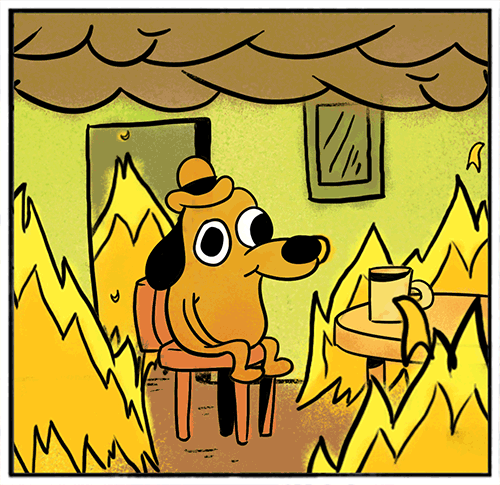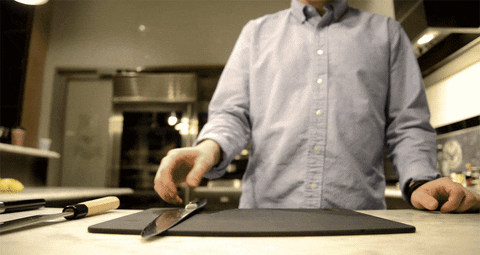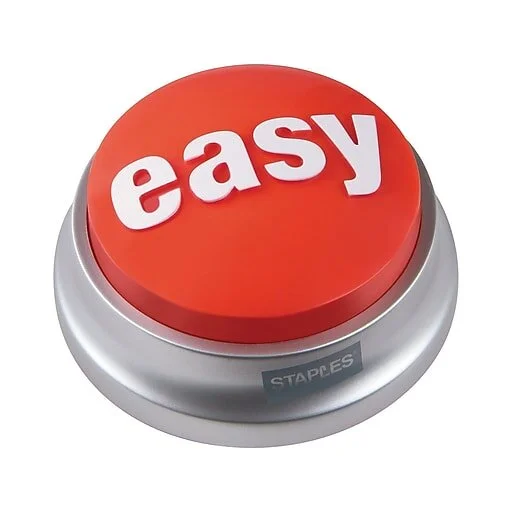How to Upgrade from a Terrible to a Mediocre Chef
The idea for this post has been sitting in our spreadsheet for well over a year now. We keep scheduling to write it, but keep putting it off because we want to try a new recipe together (like Andy’s saffron and herb rice). Also, it didn’t feel right to write this post when we first started the blog. But we’ve been writing and cooking together for over a year now — so here are a few simple tips that will help you improve your cooking skills.
1. Season Yo Food
This one is super important. You should be seasoning almost everything with salt and pepper at different stages of cooking. Salt is a flavour enhancer — it takes the taste of what’s there and just enhances it.
Obviously you should watch your sodium intake, but don’t blindly think that salt is the devil.
So how much salt and pepper should you be adding? Professional kitchens use as much salt and pepper as they think that they can get away with, but the best way to tell is to...
2. ABTYF (Always Be Tasting Your Food)
Yea, that acronym doesn’t really roll off the tongue very well, but it’s important to taste your food throughout the process. (Obviously when it is safe to do so — if you decide to taste test the raw chicken you just seasoned, that’s on you.)
Tasting can also help you catch mistakes, such as forgetting to add an ingredient.
Taste. Taste. Taste.
3. Don’t Blindly Follow Recipes
Recipes are guidelines, not Bibles. If a recipe calls for 1 teaspoon of cayenne pepper, and you have zero spice tolerance, omit it from the recipe or only add ¼ teaspoon. Don’t be like us and add 3 tablespoons of dried red chilies like an idiot, because you think Matty Matheson knows what he’s doing and it’ll be fine.
What we told our taste buds when we took our first bite. It was a lie.
As a beginner cook, you’re going to want to follow recipes to the T. And that’s okay — when you’re more experienced you can make changes and substitutions. But even as a beginner you can slightly change the amount of seasoning used to suit your own taste. If you’re always tasting your food, you’ll know if you went too far off course and can correct it before it is too late.
4. Prep (AKA Mise En Place)
Once you’ve decided on what recipe you’re going to use, it’s time to prep all the ingredients. The fancy french term for this step is mise en place. Basically it means having everything prepped and ready to go.
This is going to make the whole process of cooking much easier for you. Imagine that you’re making a cheese sauce for some mac and cheese. You’ve made the roux, you’ve added the milk or cream to get the bechamel, but you forgot to shred the cheese and collect your spices. Now, instead of just adding everything and moving on, you have to take time to grate and add the cheese and measure out the spices. While you’re doing this, the bechamel is just sitting there, cooling down (if you took it off the burner) or burning (if you didn’t take it off the heat).
Being prepared allows you to focus on what you’re cooking.
5. Use a Sharp Knife
The most handy tool for prep is a knife — a sharp knife in particular. The two most important reasons for using a sharp knife are: safety and efficiency.
Sharp knives go where you want them to go, dull knives go where they want to go. In other words, sharp knives will move predictably in a way that you want, whereas a dull knife will give you less control. Sharp knives will also cut through things much faster than a dull knife.
If you’re making french onion soup and have several pounds of onions to dice, it’s going to be much less work, and much easier on your arms (and eyes) if you’re working with a sharp knife.
A sharp knife won’t give you masterful knife skills, but it sure will make you more comfortable in the kitchen and enable you to get more confident in your slicing/dicing/chopping abilities.
6. Have a Plan
All your ingredients are prepared and portioned out and now it’s time to start making your meal. But wait, the potatoes take 45 minutes to cook, the vegetables 10 minutes, and the chicken an hour. What should you cook first? Having a time plan in place will help ensure you’re not eating a meal that’s half cold.
To figure out your time plan, work backwards from when you want to be eating. So for our above example let’s say that we want to be eating at 6pm and that plating our meal will take 5 minutes. Then our time plan might look something like this:
6:00pm: Eat
5:55pm: Start plating
5:45pm: Vegetables on
5:10pm: Potatoes on
4:55pm: Chicken in the oven
4:50pm: All prep needs to be done
4:00pm: Begin prep
When you get better at time planning you can prep certain ingredients while other things are cooking for long periods of time. But for beginners, especially those of you who are seemingly always burning things, go in with a plan. Write everything down and set up alarms in your phone so everything is finished at the same time.
If you find yourself making Thanksgiving dinner for the family one year, you’re going to want to plan when you’re prepping and cooking what, as your oven is going to be in-use for most of the day.
7. Make It Look Pretty (Plating)
Okay, so you’ve prepped your ingredients, you made your plan, and everything is coming out perfect. Now it’s time to eat! Since you’ve just spent the last hour or more cooking, we completely understand that you probably don’t want to spend any more time fiddling around with your food just to make it look nice (especially if it’s a dinner for one).
But we recommend taking the time to try to plate your food, even if it’s only every other meal. When we eat, we engage almost all of our senses, and the most important sense after taste and smell is sight. Before we get a chance to bite in we will be looking at our food, and if it looks sloppy and haphazard, then our brains are setting up certain negative expectations for the meal. However, if you take just a little bit of time and arrange your food nicely, it will get your brain thinking, “Wow, this looks great! I bet it tastes great too!” Indulge yourself a little, you just cooked something delicious, show the meal some respect and make it look pretty.
Yea, this means you can’t eat out of the pot you filthy animal.
You can’t get better at plating if you don’t practice. Plating your mundane weekly dinners will give you chances to practice and explore different techniques so that when you do need to plate something fancy for a special dinner, it isn’t your first time trying a technique. Practice makes perfect!
8. Create a Weekly Meal Plan
Picture this: you come home from work, but you have nothing taken out of the freezer for supper and have no idea what you’re going to make, so you opt for fast food instead. This happens a few times a week, which happens several times a month. You’re spending more money on fast food than groceries — and because you’re not in the kitchen as often as you should be, you don’t feel as comfortable preparing food as you should.
Meal planning not only saves you money but can make you a better cook because you’re practicing your skills more often. And you don’t have to cook every night — you can front load all of your prepping and cooking on Sunday if that fits your schedule better. What matters is that because you’re planning and prepping, you’re 1) making healthier choices and 2) able to plan for experimentation that levels up your cooking skills over time.
Making a meal plan will make your work week so much easier.
For example, without a meal plan, instead of buying fast food, you might just grab a few random things that you have in your fridge and pantry and call it a meal. But it wasn’t planned, and you’re skills aren’t at a point where you can toss a few random things together and make it taste good, so it inevitably ends up tasting not great.
With a meal plan, you can schedule trying new things! Maybe every Friday you try a new recipe, such as making Korean BBQ from scratch one night or trying to make Indian curry at home instead of ordering it. Without a meal plan, this becomes harder to do.
tl;dr Meal plan. It makes life easier. And it’ll make you a better cook because you put some actual thought into your meals. (Plus you save a ton of money by not eating out, so you can buy cool kitchen gadgets and shit.)
9. Learn How to Find High Quality Ingredients
Having great ingredients makes cooking good food a whole lot easier. This isn’t something a Mediocre Chef will master, but it’s important to look at what ingredients you buy often and which are worth splurging a bit more on than others.
Does brand X have better pasta than brand Y? What is a sign that Z fruit or vegetable is ripe/high quality?
For example, we can’t go back to use standard chocolate chips and have to use Ghirardelli chocolate in our chocolate chip cookies thanks to Binging With Babish.
B-B-B-B-BONUS ROUND
Don’t put ketchup on your steak. Please? We have nothing against ketchup per se, but it’s okay to let your meat taste like meat. And if you do insist on having a sauce with your steak, there are so many better options: peppercorn cream sauce, bearnaise sauce, red wine reduction, au jus, or a demi glace.
Don’t order the chicken fingers at every restaurant you go to. If you’re reading this, then presumably you want to get better at cooking. We didn’t really mention it, but a crucial part of getting better at cooking is developing your palate. A developed palate can distinguish different flavours and ingredients in a dish as well as giving you the ability to come up with flavour combinations without having to actually taste them (you know, from experience). The only way to develop your palate is to try new flavours, which means being adventurous and trying things that you haven’t tried before. So leave the chicken fingers alone and get out of your comfort zone once in a while.
We hope that these tips are as useful to you as they were to us when we first started out. Follow them and we guarantee that your cooking game will increase dramatically. If you have any tips that we missed, let us know in the comments below!





